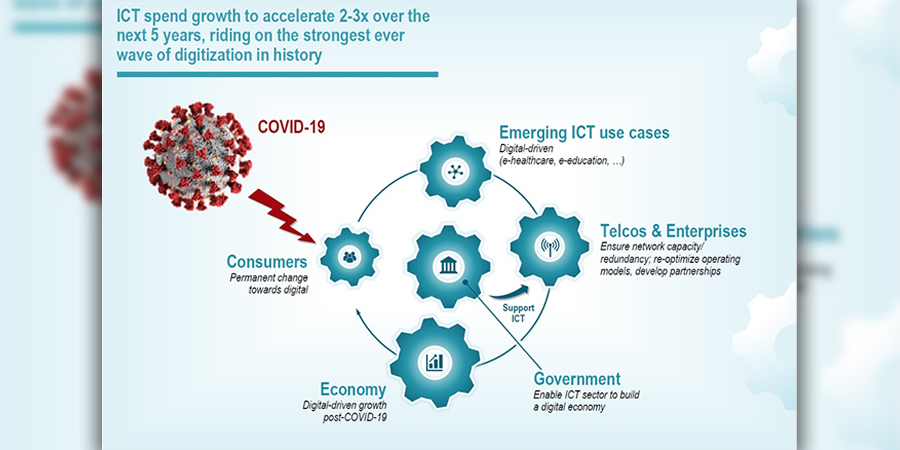Roland Berger, a leading global management consultancy firm has launched a new whitepaper that assesses the effects of COVID-19 on consumers and enterprises, and the resulting implications for the ICT industry in the GCC region.
The whitepaper, titled ‘ICT's pivotal role in post-COVID-19 “new normal”’, forecasts potential future telco and enterprise IT expenditure in the region, driven by an accelerated digitization environment post-COVID-19. It also highlights initiatives by governments in the region to stimulate the economy, the important role of the ICT sector as an economic enabler, and the potential measures regulators and governments can take to create a conducive environment for ICT investments.
The pandemic has had a permanent impact on the way consumers work, learn and shop. IP traffic has increased significantly and is now stabilizing at 30% higher than pre-COVID times, revealing the permanent nature of this shift. As such, organizations are now focused on optimizing their operating models and digitizing key processes and customer touchpoints, all of which will result in new emerging ICT use cases such as remote healthcare, online education, digitized public services, home automation, AI surveillance, and much more.
Amongst its findings, the whitepaper states that enterprise IT expenditure for GCC markets is expected to increase from USD 16.5 billion in 2019 to USD 20 billion by 2024, with sectors such as healthcare, education, media, and financial services expected to accelerate their IT spend growth by 2-3x over this period.
Moreover, the top five prioritized emerging use cases – e-consultation, e-health monitoring, e-learning, automated mining, and safety and sanitation – are expected to drive a total market opportunity of USD 5 billion in the GCC by 2024.
The report also states that telcos are expected to accelerate investment in 5G and fiber connectivity to enable new online businesses, support increased consumer demand, and ensure sufficient network redundancy. The accelerated rollout of 5G and expansion of fiber networks is projected to increase telco capital expenditure to 23% of revenue by 2021 up from 18-19% in 2019.
Separately, the report emphasizes the key role that governments play in fighting the pandemic and enabling the digital economy to support future growth. It also shares measures governments can continue to implement to support the ICT industry.
For example, the telecom industry in our region can help boost economic growth by accelerating investments in 5G and fiber. The study estimates investment in 5G to add 6-8% to countries' GDP combining direct, indirect and induced impacts. To that end, governments will need to support telcos by providing them with temporary monetary relief, drive operational efficiencies as well as support the SME ecosystem, in order to enable a strong economic recovery and ensure long-term growth.
Kushal Shah, senior partner and head of the digital practice in Asia from Roland Berger commented on the White Paper: “The COVID-19 pandemic will have a seismic and permanent impact on our lives – work, life and play as we knew it will no longer be the same again. Our report studies how COVID-19 has affected economies, businesses and consumers in the Middle East region, and will lead to new, digital-driven use cases emerging in an ICT-led economic recovery. The report also highlights the Telco and Enterprise IT spend expected over the next few years in the region to drive this recovery as well as the key role that governments and regulators can play in supporting the ICT sector.”
This study has been co-sponsored by Huawei. The full report can be downloaded here.










